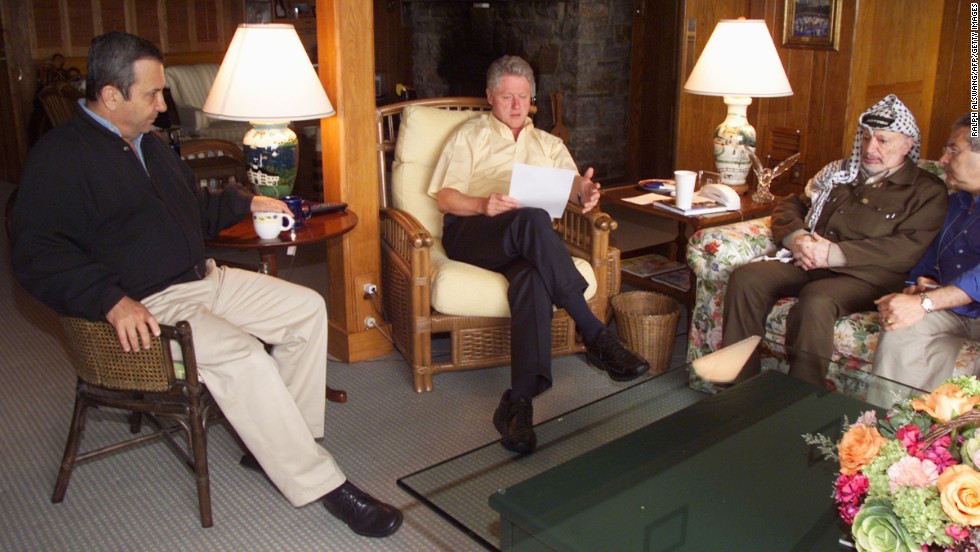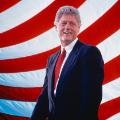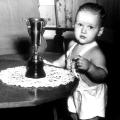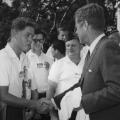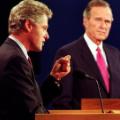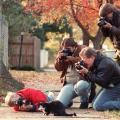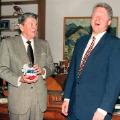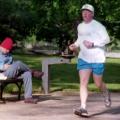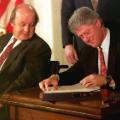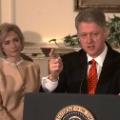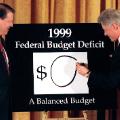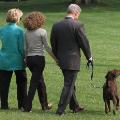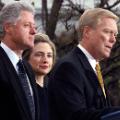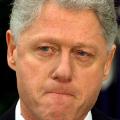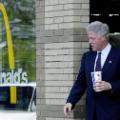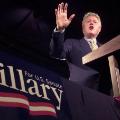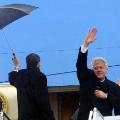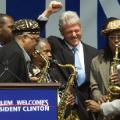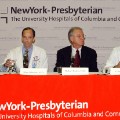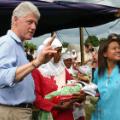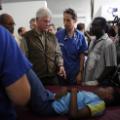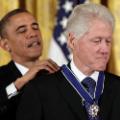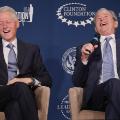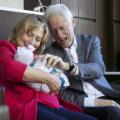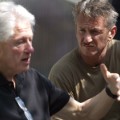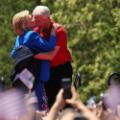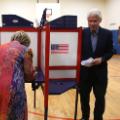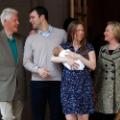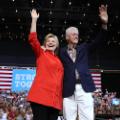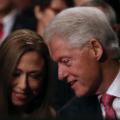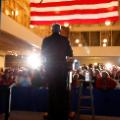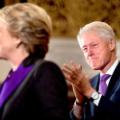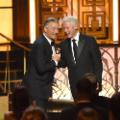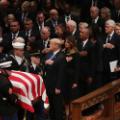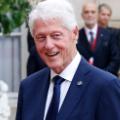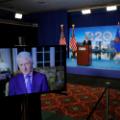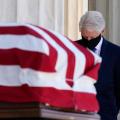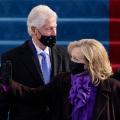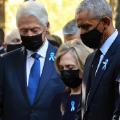Here's a look at the life of Bill Clinton, 42nd president of the United States.
Personal
Birth date: August 19, 1946
Birth place: Hope, Arkansas
Birth name: William Jefferson Blythe III
Father: William Blythe
Mother: Virginia (Kelley) Blythe
Marriage: Hillary (Rodham) Clinton (October 11, 1975-present)
Children: Chelsea Victoria, February 27, 1980
Education: Georgetown University, B.S., 1968; Oxford University, Rhodes Scholar, 1968-1970; Yale University, J.D., 1973
Religion: Baptist
Other Facts
Clinton was born three months after his father, William Blythe, died in a car accident.
In his teens, Clinton adopted his stepfather Roger Clinton's last name.
The first Democrat since Franklin Delano Roosevelt to be elected to a second term.
Second US president to be impeached. The first was Andrew Johnson in 1868.
Nominated for four Grammy Awards with two wins.
Timeline
1972 - Directs the Texas campaign of Democratic presidential candidate George S. McGovern.
1974 - Runs unsuccessfully for the House seat of Arkansas's Third Congressional District.
1976 - Elected Arkansas state attorney general.
1978 - Is elected governor of Arkansas at age 32.
1980 - Loses gubernatorial reelection.
1982 - Wins the gubernatorial election.
1984 - Reelected as governor of Arkansas. Also reelected in 1986 and 1990.
October 3, 1991 - Announces his campaign for president.
June 3, 1992 - Clinton plays the saxophone on "The Arsenio Hall Show."
November 3, 1992 - Is elected president, defeating George H.W. Bush and H. Ross Perot.
January 20, 1993 - Is sworn in as the 42nd president.
November 30, 1993 - Signs into law the Brady Handgun Violence Prevention Act. The law requires background checks and a five-day waiting period for handgun purchases.
December 8, 1993 - Signs into law the North American Free Trade Agreement (NAFTA), which takes effect on January 1, 1994.
May 6, 1994 - Paula Corbin Jones, a former Arkansas state employee, files a federal civil lawsuit in Little Rock, Arkansas, accusing Clinton of making "persistent and continuous" unwanted sexual advances toward her during a business conference in May 1991, when Clinton was the governor of Arkansas.
August 1994 - Kenneth Starr is appointed as special counsel to investigate a failed real estate venture known as Whitewater.
September 13, 1994 - Clinton signs the Violent Crime Control and Law Enforcement Act of 1994 into law. The bill increases funding for police departments and imposes tougher prison sentences for federal crimes.
November 5, 1996 - Clinton is reelected for a second term.
February 25, 1997 - The White House releases documents from 1995 that show Clinton had approved of plans to reward Democratic Party donors with overnight stays in the Lincoln Bedroom.
January 17, 1998 - During a videotaped deposition by Jones' lawyers, Clinton denies a sexual relationship with former White House intern Monica Lewinsky.
January 21, 1998 - The story about the Lewinsky allegations breaks in the press. The allegations come to light after Starr learns of audiotapes on which Lewinsky describes the alleged affair and cover-up to a confidante, Linda Tripp.
January 26, 1998 - Clinton declares, "I did not have sexual relations with that woman."
February 2, 1998 - Clinton signs the first balanced budget since 1969.
August 6, 1998 - Lewinsky testifies before the grand jury about her relationship with Clinton.
August 17, 1998 - Clinton testifies before the grand jury and admits having "inappropriate intimate contact" with Lewinsky, but says it did not constitute sexual relations because they had not had intercourse.
September 11, 1998 - The House releases the Starr Report to the public.
October 8, 1998 - The House votes, 258-176, to begin an impeachment investigation of Clinton.
November 13, 1998 - Clinton agrees to pay Jones $850,000 to settle her sexual harassment lawsuit.
December 11-12, 1998 - The House Judiciary Committee approves four articles of impeachment against Clinton, accusing him of lying under oath, obstructing justice and abusing his presidential power in an effort to conceal a sexual relationship with Lewinsky.
December 16, 1998 - The United States and Britain launch four days of air strikes against Iraq after months of trying and failing to get Saddam Hussein to cooperate with UN weapons inspectors.
December 19, 1998 - The full House approves two of the four articles (perjury and obstruction of justice). Clinton becomes the second president in US history to be impeached.
January 7, 1999 - Senate trial on perjury and obstruction of justice charges begins.
February 12, 1999 - Senate trial ends with an acquittal. The vote on the perjury charge is 55 to 45 and the obstruction of justice charge is split 50-50. A two-thirds majority, or 67 votes, was required for conviction.
September 20, 2000 - After six years, independent counsel Robert Ray closes the Whitewater investigation, clearing the Clintons of any wrongdoing.
January 15, 2001 - A cancerous lesion is removed from Clinton's back. Doctors determine the cancer did not spread and do not consider it serious.
January 19, 2001 - The day before leaving office, Clinton agrees to give up his Arkansas law license for five years, and to pay a $25,000 fine to the state bar association, ending efforts by the Arkansas Supreme Court Committee on Professional Conduct to disbar him.
January 20, 2001 - Hours before leaving office, Clinton pardons 141 people, including Whitewater figure Susan McDougal and publishing heiress Patty Hearst. The most controversial pardon is that of financier Marc Rich, who had been a fugitive in Switzerland. The president also pardons his brother, Roger Clinton, who had been convicted on a cocaine charge in the 1980s.
July 30, 2001 - Formally opens his post-presidential office in the Harlem neighborhood of New York City.
February 8, 2004 - Clinton wins a Grammy as one of several guest narrators on "Prokofiev: Peter And The Wolf/Beintus: Wolf Tracks." The album wins Best Spoken Word Album for Children.
June 22, 2004 - Clinton's memoir, "My Life," is published.
July 27, 2004 - Clinton is the keynote speaker on the first night of the Democratic National Convention in Boston.
September 3, 2004 - Clinton goes to Northern Westchester Hospital after experiencing mild chest pain and shortness of breath. Doctors say bypass surgery is necessary.
September 6, 2004 - Undergoes a four-hour bypass operation at New York Presbyterian Hospital. His doctors announce that some of his arteries had been blocked more than 90%.
November 18, 2004 - The William J. Clinton Presidential Center and Park opens in Little Rock, Arkansas.
January 3, 2005 - President George W. Bush appoints former Presidents George H.W. Bush and Clinton to head fundraising efforts for humanitarian aid after a devastating tsunami in Southeast Asia.
February 1, 2005 - UN Secretary General Kofi Annan appoints Clinton as the UN envoy for tsunami reconstruction.
February 13, 2005 - Wins a Grammy Award for Best Spoken Word Album for "My Life."
February 2005 - Clinton and George H.W. Bush travel to Asia to visit the areas hit by the tsunami.
September 5, 2005 - George H.W. Bush and Clinton announce the formation of the Bush-Clinton Katrina Fund, to assist victims of Hurricane Katrina.
July 12, 2006 - Clinton and Bill Gates travel to Lesotho to visit an HIV/AIDS clinic supported by the William J. Clinton Foundation (later renamed the Clinton Foundation). It is the fifth time Clinton has been to Africa to promote AIDS awareness since 2001.
September 4, 2007 - Clinton's book, "Giving," is published. In it, he gives examples of how the generosity of everyday people can positively impact the world.
August 27, 2008 - Clinton gives a speech at the 2008 Democratic National Convention supporting Barack Obama for president.
May 19, 2009 - Clinton is appointed as the United Nations Special Envoy for Haiti.
August 4, 2009 - Clinton goes to North Korea, meets with North Korean leader Kim Jong Il and secures a pardon and release of US journalists Euna Lee and Laura Ling.
February 3, 2010 - UN Secretary-General Ban Ki-moon places Clinton in charge of overseeing aid and reconstruction efforts in Haiti, after a 7.0 earthquake in January.
February 11, 2010 - Is rushed to New York Presbyterian Hospital with "chest discomfort" and undergoes a procedure that places two stents in one of his arteries.
November 8, 2011 - Clinton's book about how to revive the economy, "Back to Work," is published.
November 20, 2013 - Is awarded the Presidential Medal of Freedom by Obama.
July 26, 2016 - Speaks at the Democratic National Convention in Philadelphia after Hillary Clinton becomes the Democratic Party nominee for president and the first woman in the history of the United States to lead the presidential ticket of a major political party.
June 4, 2018 - "The President is Missing," a novel co-written by Clinton and James Patterson, is published. During an interview with NBC to publicize the book, Clinton is asked if he owes Lewinsky a personal apology. He responds, "No, I do not - I have never talked to her. But I did say publicly on more than one occasion that I was sorry. That's very different. The apology was public."
June 5, 2018 - Clinton expresses regret over his comments during the NBC interview. He says, "The important thing is that was a painful thing that happened 20 years ago and I apologized to my family, to Monica Lewinsky and her family, to the American people. I meant it then; I meant it now. I have had to live with the consequences every day since."
March 6, 2020 - In "Hillary," a new documentary that traces the former first lady's life and career, Clinton says he feels "terrible" that the affair has "unfairly" defined Lewinsky's life.
October 12, 2021 - Clinton is admitted to the University of California Irvine Medical Center's intensive care unit to be treated for a urinary tract infection that spread to his bloodstream. He is released from the hospital on October 17.
November 30, 2022 - Clinton announces that he has tested positive for Covid-19 and is experiencing mild symptoms.


























